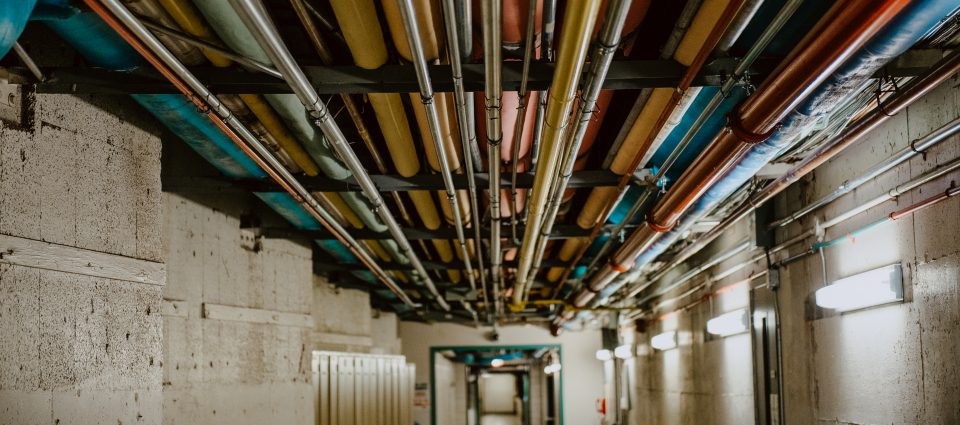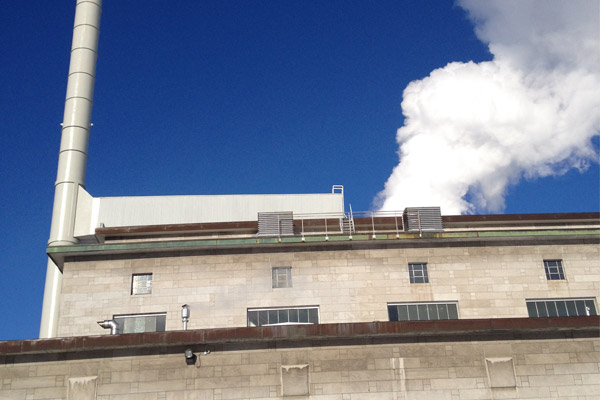Energy
Through its use of energy-efficient facilities, innovative technologies, and a growing supply of renewable energy, Université Laval combines leadership and ingenuity to pursue its energy transition.

A sustained drive toward the energy transition
Université Laval is working with the University community to reduce its environmental impact and focus on a sustainable energy transition. In concrete terms, the University has adopted an Energy Management Policy (PDF, available in French only), an action plan, and bold targets to improve the energy efficiency of its infrastructure and processes.
PFor more information or to send us your suggestions, write to info@developpementdurable.ulaval.ca.
Energy overview
In the past year, Université Laval used nearly 996,217 gigajoules (GJ) of energy, a 4% reduction over the previous year. Of that amount, 57% was derived from renewables.
531,685 GJ of hydroelectricity, including 105,512 GJ used by the electric boiler to produce steam
33,279 GJ of renewable natural gas from biomethanization
3,770 GJ of No. 2 fuel oil used primarily for the generator set
10,932 GJ of No. 6 fuel oil used during partial natural gas interruptions
416,434 GJ of fossil natural gas
117 GJ of propane for laboratory use
Collaborating for the well-being of all
Université Laval has committed to replacing 8% of its annual natural gas consumption with renewable natural gas (RNG). To this end, the University is proud to have concluded a multi-level partnership with Energir.
The transition to RNG will reduce campus GHG emissions by approximately 1,888 tonnes annually, the equivalent of 472 cars travelling 15,000 km per year

One action at a time
To achieve its energy intensity targets, the University is counting on the implementation of the 2020–2025 energy action plan. As part of the action plan, the teams responsible for energy monitor building energy consumption, advances in renewable energy, and promising new technologies.
Targets
Université Laval has opted for bold energy reduction targets that testify to its leadership in the fight against climate change.
- 11% reduction in energy intensity by 2023 in comparison to the 2012–2013 baseline year
- 20% reduction in energy intensity by 2030 in comparison to the 2012–2013 baseline year
Priorities
- Assess whether campus electrical capacity can be increased
- Improve thermal insulation on steam pipes and recover heat from service tunnels
- Adjust HVAC system operation based on classroom occupancy
- Educate and inform the university community about energy issues
- Seize opportunities presented by major renovation projects to improve energy efficiency in campus buildings
Results
- More than 10 feasibility analyses for energy reduction or transition projects
- 10 self-financed infrastructure projects
- 18 activities related to energy management, system optimization, energy education, and communication and collaboration with the student community
- 4 major renovation projects

The mystery of the tunnel pipes
If you’ve been through the tunnels at Université Laval, you may have noticed the pipes lining the walls. This piping is a core component of the campus utilities network. Many of these carrier pipes transport energy from University power plants to campus buildings to meet their heating, cooling, and electricity needs.
Other carrier pipes contain cables crucial to the operation of ventilation and building automation systems. Some buildings use heat pumps for their heating needs, substantially reducing the use of fossil fuels. Other buildings are exothermic, i.e., they produce heat that can be reused in an adjacent building.
On the move

The University is currently conducting two studies related to energy use on campus. It is analyzing the campus grid’s electrical capacity and examining ways of optimizing insulation and recovering energy from service tunnels.
In the Arena, spectators may not realize it but the University is in the process of upgrading lighting. Both of the skating rinks and the bleachers will soon feature LED technology.
Thanks to a joint effort by Professor Louis Gosselin and Building Services staff, the University has developed virtual tours of the boiler room in the Gérard-Bisaillon Building and the mechanical rooms in the Adrien-Pouliot Building. These online tours allow students to view these facilities in full, despite certain constraints.
Our shared achievements
Université Laval’s energy efficiency efforts have reduced campus energy intensity by 23% since 2005, even as the surface area of campus building and infrastructure increased by approximately 16%.
In fall 2020, Building Services and Professor Louis Gosselin teamed up to give undergraduate students a chance to work on a concrete issue facing the University. This living lab initiative was welcomed by students, who saw it as an opportunity to have an impact on their campus environment. Their projects generated original new ideas and ways of thinking.

Did you know?
If all the computers on campus were shut down every time they were no longer in use, the electricity savings would be equivalent to the quantity required to power the Desjardins-Pollack Building for a year!
If everyone turned off the lights in their workspaces every time they left for more than an hour, the electricity savings would be equivalent to the amount needed to power two Desjardins-Pollack Buildings for an entire year!
Advisory committee
An advisory committee has been established to foster interdisciplinary and intersectoral collaboration with the university community. Made up of students, professional staff, and teaching faculty, the committee is tasked with suggesting appropriate performance indicators and fair and ambitious targets. The advisory committee helps develop, monitor, and update the action plan for its area of activity.
Marise Vallières
Responsible for the energy axis
Research and Planning Officer (energy component)
Building Services
Audrey Boivin
Operations Coordinator
Office of the Vice Rector, External and International Affairs and Health
Louis Gosselin
Tenured professor
Department of Mechanical Engineering
Faculty of Science and Engineering
Soro Kagnery Mohamed Coulibaly
PhD student
Law Faculty
Étienne Berthold
Associate Professor and Director of the EDS Institute
Department of Geography
Faculty of Forestry, Geography and Geomatics
Évelyne Thiffault
Associate Professor
Department of Wood and Forest Sciences
Faculty of Forestry, Geography and Geomatics
Eric Walling
PhD student in chemical engineering
Faculty of Science and Engineering